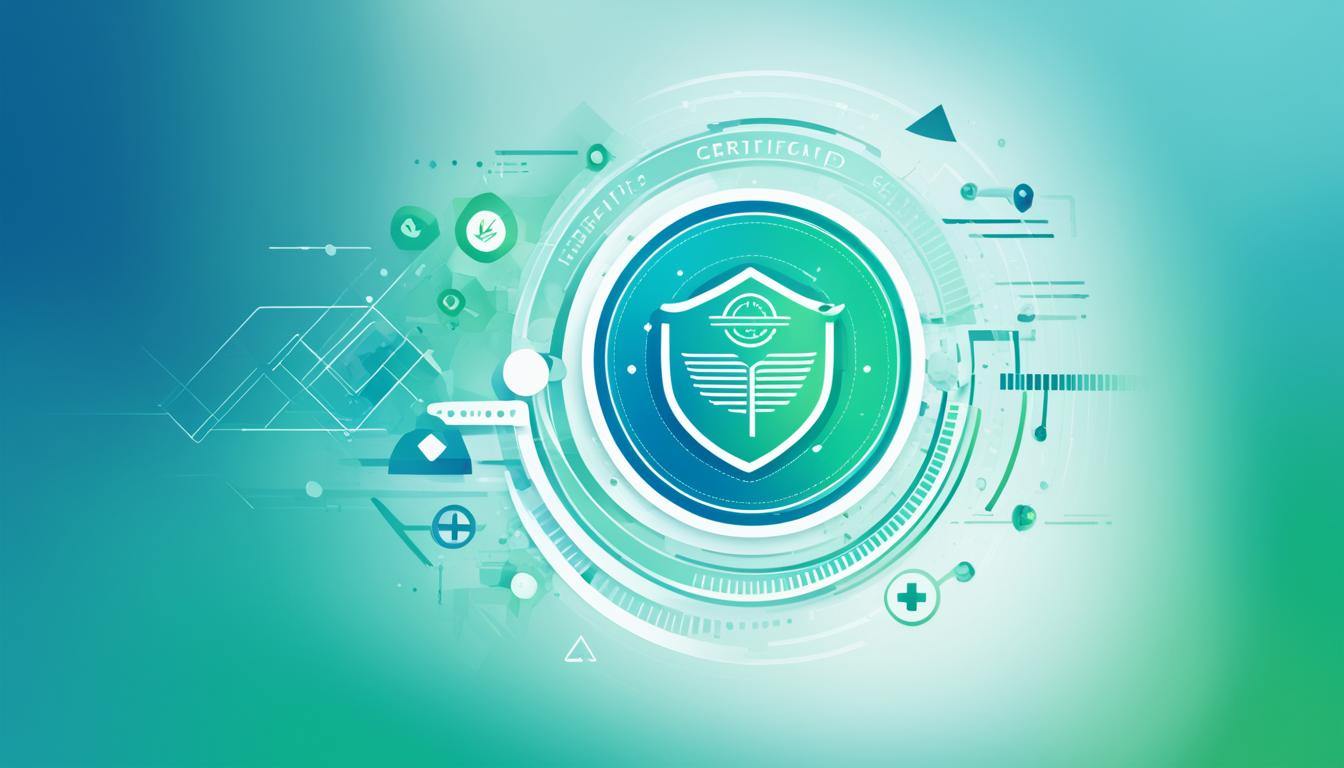Review of the Certified in Healthcare Privacy and Security (CHPS) Certification
Every day, the healthcare industry faces about 4 data breaches. These breaches expose private patient information, impacting millions of records. This situation poses a real risk to patient privacy and security.
Given the digital world we live in, safeguarding patient data is more critical than ever. The CHPS certification is key. It helps healthcare professionals understand how to protect this sensitive information. It also ensures they meet the tough privacy rules.
Key Takeaways:
- The CHPS certification is vital for healthcare privacy and security professionals.
- It validates expertise in safeguarding patient information and ensuring compliance.
- Obtaining the certification enhances professional credibility and job prospects.
- Certified professionals have access to a wide range of career opportunities in the healthcare industry.
- The CHPS certification sets professionals apart with its comprehensive coverage of privacy and security topics specific to healthcare.
What is the CHPS certification?
The CHPS certification shows expertise in healthcare data safety. It’s for professionals who keep sensitive health info safe while following laws.
It’s for those in healthcare who make sure patient info stays private and secure. Getting certified shows you’re top-notch in this important area.
Now, more than ever, health places need experts to keep data safe. The CHPS certification gives needed skills to help in this.
“The CHPS certification gives healthcare experts a leg up in job searching, making them stand out and boosting their career paths.”
People with CHPS know key privacy laws like HIPAA. They can set up rules to keep data safe and following the law.
Getting CHPS proves a commitment to data privacy and growing in this profession. It also offers chances for better jobs and growth in your career.
Key Highlights of the CHPS Certification:
- Validates expertise in healthcare privacy and security
- Demonstrates compliance with privacy regulations
- Enhances professional credibility
- Expands job prospects and earning potential
- Provides access to a network of professionals in the industry
Who Should Pursue the CHPS Certification?
CHPS is perfect for those in healthcare data safety, including:
- Privacy officers
- Security analysts
- Compliance managers
- IT professionals in healthcare
- Auditors
- Consultants
If you’re into keeping patient data safe and law-abiding, CHPS is for you. Next, we’ll cover the perks, what you need, and the exam for CHPS.
Benefits of the CHPS certification
Earning the CHPS certification helps healthcare privacy and security experts in many ways. It boosts how others see your skills and knowledge. This certification is well respected, showing you’re a leader in the field. It also opens new doors for your career. Let’s look at the main ways CHPS helps:
1. Professional Credibility and Recognition
CHPS shows you know your stuff when it comes to keeping healthcare data safe. It proves you’re serious about keeping patient information private and secure. With CHPS, people see you as top-notch in your job, which is great for your career.
2. Validation of Expertise
By earning CHPS, you become a go-to person for healthcare data safety. You learn a lot about privacy laws, managing risks, and protecting data. This certification shows you can handle the tough privacy issues that come in healthcare.
3. Enhanced Job Prospects
CHPS can really help you land better jobs in healthcare. Companies look for professionals who have expert certifications. With CHPS, you become very desirable for job openings. It gives you an edge over others looking for work.
4. Increased Earning Potential
People with the CHPS certification tend to make more money. This certification proves you’re great at safeguarding patient data. It opens up top-paying job opportunities for you. So, it’s a big plus for your wallet.
5. Access to a Professional Network
CHPS also gets you into a group of other healthcare privacy and security experts. Being part of this group means chances to work on new things, share tips, and grow in your career. It’s a great way to learn and move up in your field.
6. Continual Professional Development
To keep CHPS, you need to keep learning. Staying current in privacy and security is key. With ongoing learning, your career stays strong and you remain a trusted expert.
Getting the CHPS certification is a smart move for anyone in healthcare data safety. It shines a light on your professionalism, expertise, and job opportunities. Plus, it leads to a strong network and chances to always learn and grow.
CHPS certification requirements
To get the CHPS certification, you need to meet certain criteria. This is to make sure you have the right education and experience. You must know about healthcare privacy and security to be eligible.
For the CHPS certification, you need:
- Education like a bachelor’s degree in healthcare admin or IT.
- Work experience in healthcare privacy and security. AHIMA needs at least two years.
After you meet these requirements, you must take a big test. This exam checks your skills and knowledge. It makes sure you’re ready to keep patient information safe and follow the rules.
“The CHPS certification requirements focus on education and real-world experience. They help certified professionals know how to protect important data and follow rules.”
CHPS Certification Exam
The CHPS exam looks at many topics on privacy and security. It tests your knowledge on laws, risk assessment, preventing data breaches, and more. The test has multiple-choice and some applied questions.
To study for the exam, use resources from the certification group. These include study guides and online tools. You might also want to take prep courses to be more ready.
Benefits of CHPS Certification
- It boosts how credible you look professionally.
- It shows you’re good in healthcare privacy and security.
- More chances for jobs and higher pay.
- Join a group of professionals in the field.
CHPS certification exam details
The CHPS certification exam is key in the journey to be a Certified in Healthcare Privacy and Security (CHPS) professional. It tests your understanding of healthcare privacy and security. This is to make sure you know how to keep patient info safe.
This test has multiple-choice questions and might have scenarios. It’s designed for you to show you understand how to handle real situations. You’ll need to know about data protection, healthcare privacy laws, and more.
- Data protection and encryption
- Healthcare privacy regulations
- Security risk assessment
- Access controls and user management
- Incident response and breach management
Getting ready for the CHPS exam is very important. You should use guides and practice tests from the certifying body. This lets you learn what the test is like and cover the topics well.
Also, taking part in preparation courses can really help. They offer expert tips, recommendations, and plans to study effectively. It’s a good way to get ready for the test.
Getting the CHPS certification is all about being well-prepared and understanding privacy and security in healthcare. With the right materials and a focus on studying, passing the exam is possible. This shows you’re good at taking care of patient info.
To sum it up, the CHPS exam checks your healthcare privacy and security know-how. By studying hard and using available resources, you can do well and become CHPS-certified.
Career opportunities for CHPS-certified professionals
CHPS-certified professionals have many career paths in the healthcare field. Their knowledge in healthcare privacy and security is key. They play vital roles in keeping patient info safe and meeting privacy rules.
Here are some jobs for CHPS-certified experts:
- Privacy Officers: They make and enforce privacy policies in healthcare settings. Their job is to keep patient data safe and private, following all the rules.
- Security Analysts: These experts work to stop security threats in healthcare. They check for risks, watch the security measures, and handle issues to protect patient information from getting into the wrong hands.
- Compliance Managers: These managers make sure health orgs follow the rules about privacy and security. They check on compliance, set up training, and do audits to protect patient privacy.
- Consultants: These experts offer advice to healthcare places looking to be better at privacy and security. They help with managing risks, following the rules, and setting up safe systems and processes.
As the need for keeping data safe grows in healthcare, CHPS-certified pros are in high demand. They do important work to keep patient info secure and create a strong privacy culture in healthcare.
Renewal and maintenance of the CHPS certification
The CHPS certification is significant for healthcare privacy and security pros. But, it’s not a one-time win. These pros must keep it current with the changing scene of privacy and security. They need to renew and meet certain upkeep rules.
Renewal:
Keeping the CHPS certification means pros still meet the needed knowledge and skills. This is vital for protecting patient info and following privacy laws. The certification lasts about three years. Pros must renew it before it expires.
To get the CHPS certification renewed, pros must follow the body’s specific rules. These include:
- Completion of a set amount of continuing education credits.
- Showing they’re active in healthcare privacy and security.
- Paying renewal fees.
Meeting these rules shows a dedication to growing professionally. It proves a desire to know the latest in the field.
Continuing Education:
Continuing education is key for CHPS certification renewal. It keeps pros current with new industry trends, laws, and technology in healthcare privacy and security. Professionals must earn a set number of credits during the renewal period.
Ways to earn continuing education credits include:
- Going to healthcare privacy and security conferences, workshops, and seminars.
- Doing online courses and webinars.
- Self-study and research.
- Writing for industry publications or speaking at events.
Actively learning allows pros to not only keep their CHPS certification but also to grow their expertise. It boosts their credibility too.
Benefits of Renewal and Continuing Education:
“Renewing the CHPS certification and actively pursuing continuing education credits bring several benefits to certified professionals.”
| Benefits | Description |
|---|---|
| Professional Growth | Renewal and continuing education help pros stay on top of new developments. It makes them more valuable, leading to more career growth chances. |
| Credibility | Keeping the CHPS certification shows pros are serious about high standards. It proves their credibility and professionalism to others in the field. |
| Network Expansion | Learning more often leads to meeting more people in the field. This includes experts, peers, and maybe future employers or clients. |
| Compliance | By studying the latest, pros make sure they follow the newest regulations. This is crucial for maintaining privacy and security in healthcare. |
Comparison with other healthcare privacy and security certifications
In the world of healthcare privacy and security, many certifications are available. Yet, the Certified in Healthcare Privacy and Security (CHPS) certification is highly respected. It is known for its deep coverage of topics critical in the healthcare sector. As a result, it’s seen as a top credential for experts in healthcare privacy and security.
The CHPS certification goes above basic knowledge. It explores the details of keeping patient information safe in healthcare. It includes topics like data privacy rules, risk assessment, how to handle security incidents, and what to do after a breach. By focusing on healthcare’s unique challenges, the CHPS certification prepares professionals to tackle its specific privacy and security issues.
In comparison to more general certifications, the CHPS focuses solely on healthcare’s privacy and security needs. This makes it more valuable for healthcare employers looking for specialists to protect sensitive data.
“The CHPS certification has truly boosted my career in healthcare privacy and security. Its insights into healthcare’s unique struggles have guided me through complex rules. It has enabled me to put strong privacy and security practices in place at my workplace.” – Jane Smith, CHPS-certified professional
Comparison of CHPS Certification with Other Healthcare Privacy and Security Certifications:
| Certification | Focus | Recognition | Industry-specific |
|---|---|---|---|
| CHPS Certification | Comprehensive coverage of healthcare privacy and security topics | Recognized as a prestigious credential | Specifically tailored to the healthcare industry |
| Certification X | General overview of privacy and security practices | Widely recognized in various industries | Not industry-specific |
| Certification Y | Focused on compliance with privacy regulations | Not widely recognized | Not industry-specific |
| Certification Z | Emphasizes cybersecurity in healthcare | Emerging recognition | Specifically tailored to the healthcare industry |
The CHPS certification shines because it offers in-depth coverage of healthcare privacy and security. While other certifications might cover general practices, CHPS focuses on the healthcare sector’s specific challenges. This makes it essential for professionals aiming to excel in keeping patient information safe.
Choosing the CHPS certification shows a professional’s dedication to top-notch healthcare privacy and security. The knowledge and skills gained with CHPS opens doors to better career paths. It also plays a crucial role in protecting patient data across the healthcare sector.
Resources for CHPS certification preparation
To get ready for the CHPS certification exam, there are many useful resources available. These are all set to give you the knowledge and skills you need. Let’s look at what you can use to prepare for the CHPS certification:
1. Study Guides
First up, we have study guides. These books go over everything you need to know for the CHPS exam. Inside, you will find detailed explanations, examples, and practice questions. They are great for making sure you really understand the material.
2. Practice Exams
Next, we have practice exams. They are very important for checking your knowledge. These tests are made to look and feel like the real CHPS exam. They help you get used to the test’s format and challenges.
3. Online Resources
The certifying body also offers online tools like webinars and videos. These are there to help you study further and refresh important points from the guides. You can use them at any time that suits you, so it’s very flexible.
4. Review Courses and Workshops
If you like learning in group settings, review courses and workshops will help. In these classes, experts will cover the exam material and give you tips. Plus, you get to talk with others studying for the same test.
5. Professional Networking
Networking with other CHPS-certified professionals is a great idea too. It can give you support and new insights into preparing for the exam. You can join events, forums, and online groups to connect with others.
Using these resources will make you more informed about healthcare privacy and security. This will help you be well-prepared for the CHPS certification test.
Conclusion
The CHPS certification is very important for people in healthcare who deal with privacy and security. It shows they are good at keeping patient information safe. They make sure to follow the privacy laws. By getting this certification, their job options get better. They can help keep healthcare data safe and private.
In today’s world, keeping data safe is a big deal in healthcare. The CHPS certification makes professionals stand out. It shows they are serious about keeping data private and safe. This can lead to many job options. They can work as privacy officers, security experts, or consultants. This certification helps them get these jobs.
Also, by being CHPS certified, you join a group of people who care about healthcare security and privacy. This group helps its members learn and share knowledge. It is a way to keep up with what’s new and what’s best in the field. Healthcare is always changing and needing better security. So, the CHPS certificate is really helpful for people working in this area.







